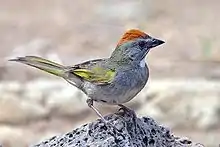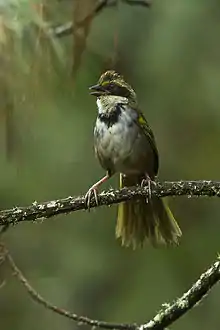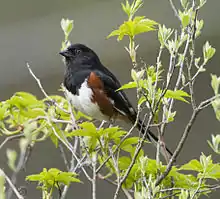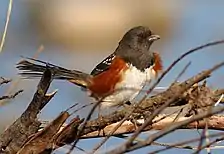Pipilo
Pipilo is a genus of birds in the American sparrow family Passerellidae. It is one of two genera containing birds with the common name towhee.
| Pipilo | |
|---|---|
.jpg.webp) | |
| Spotted towhee (Pipilo maculatus) | |
| Scientific classification | |
| Kingdom: | Animalia |
| Phylum: | Chordata |
| Class: | Aves |
| Order: | Passeriformes |
| Family: | Passerellidae |
| Genus: | Pipilo Vieillot, 1816 |
| Type species | |
| Fringilla erythrophthalma Linnaeus, 1758 | |
| Species | |
|
See text | |
Taxonomy
The genus Pipilo was introduced by the French ornithologist Louis Jean Pierre Vieillot in 1816 with the eastern towhee as the type species.[1][2] The name Pipilo is New Latin for "bunting" from pipilare "to chirp".[3] Within the New World sparrow family Passerellidae the genus Pipilo is sister to the large genus Atlapetes.[4]
Species
The genus contains five species:[5]
| Image | Scientific name | Common Name | Distribution |
|---|---|---|---|
 | Pipilo chlorurus | Green-tailed towhee | interior Western United States, with a winter range in Mexico and the southern edge of the Southwestern United States |
 | Pipilo ocai | Collared towhee | Mexico. |
 | Pipilo erythrophthalmus | Eastern towhee | eastern North America |
 | Pipilo maculatus | Spotted towhee | across western North America |
- Bermuda towhee Pipilo naufragus (extinct)
References
- Vieillot, Louis Jean Pierre (1816). Analyse d'une Nouvelle Ornithologie Élémentaire (in French). Paris: Deterville/self. p. 32.
- Paynter, Raymond A. Jr, ed. (1970). Check-List of Birds of the World. Volume 13. Cambridge, Massachusetts: Museum of Comparative Zoology. p. 168.
- Jobling, J.A. (2018). del Hoyo, J.; Elliott, A.; Sargatal, J.; Christie, D.A.; de Juana, E. (eds.). "Key to Scientific Names in Ornithology". Handbook of the Birds of the World Alive. Lynx Edicions. Retrieved 7 July 2018.
- Bryson, R.W.; Faircloth, B.C.; Tsai, W.L.E.; McCormack, J.E.; Klicka, J. (2016). "Target enrichment of thousands of ultraconserved elements sheds new light on early relationships within New World sparrows (Aves: Passerellidae)". The Auk. 133 (3): 451–458. doi:10.1642/AUK-16-26.1.
- Gill, Frank; Donsker, David; Rasmussen, Pamela, eds. (2020). "New World Sparrows, Bush Tanagers". IOC World Bird List Version 10.2. International Ornithologists' Union. Retrieved 12 October 2020.
External links
 Media related to Pipilo at Wikimedia Commons
Media related to Pipilo at Wikimedia Commons Data related to Pipilo at Wikispecies
Data related to Pipilo at Wikispecies- Towhee videos, photos and sounds on the Internet Bird Collection
This article is issued from Wikipedia. The text is licensed under Creative Commons - Attribution - Sharealike. Additional terms may apply for the media files.